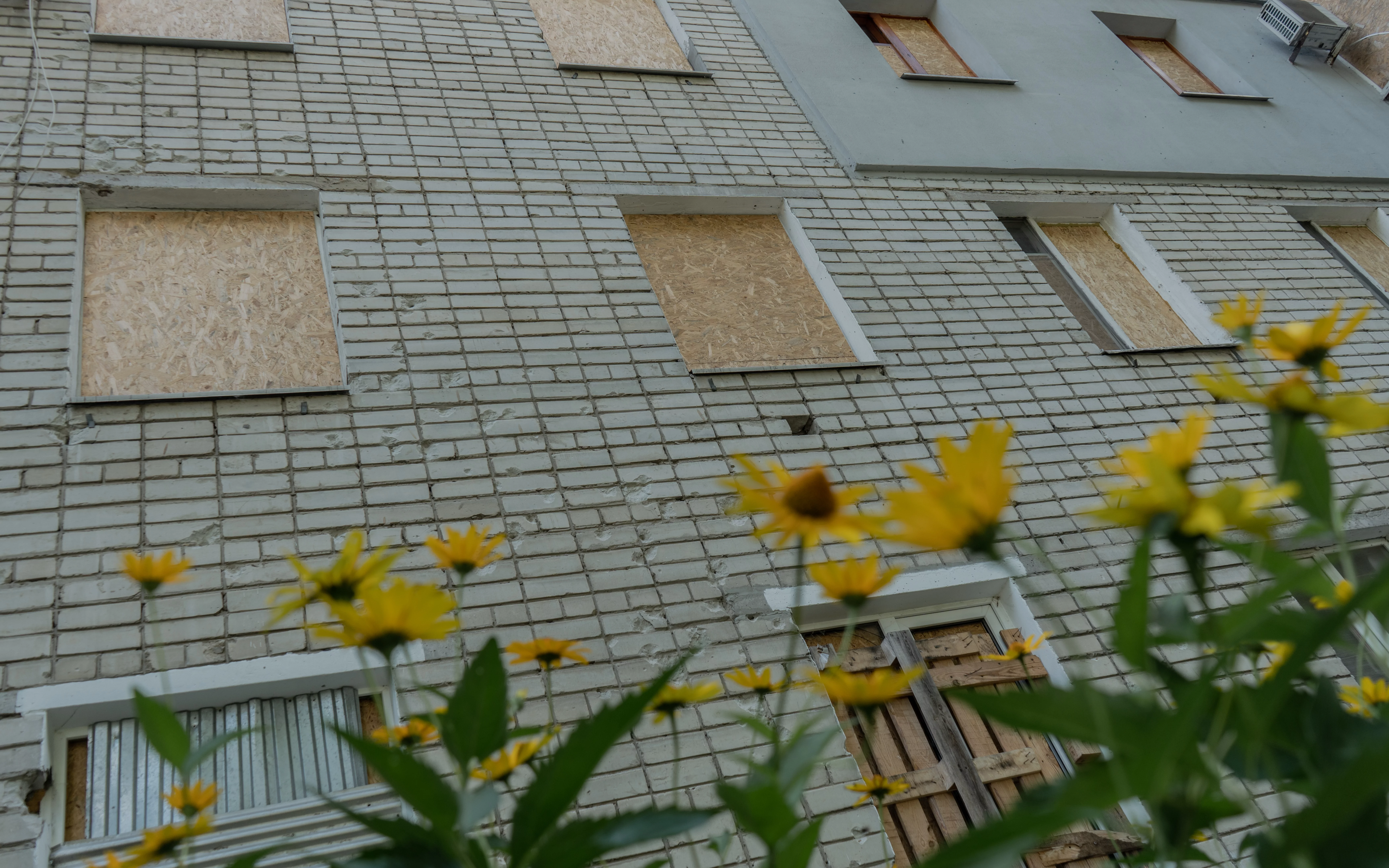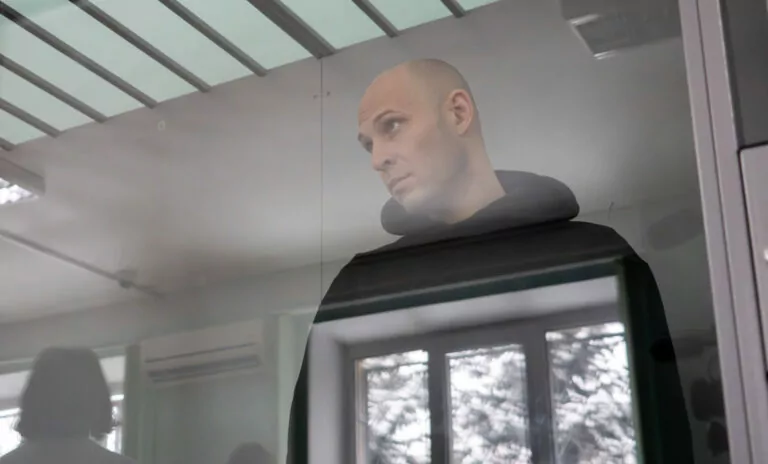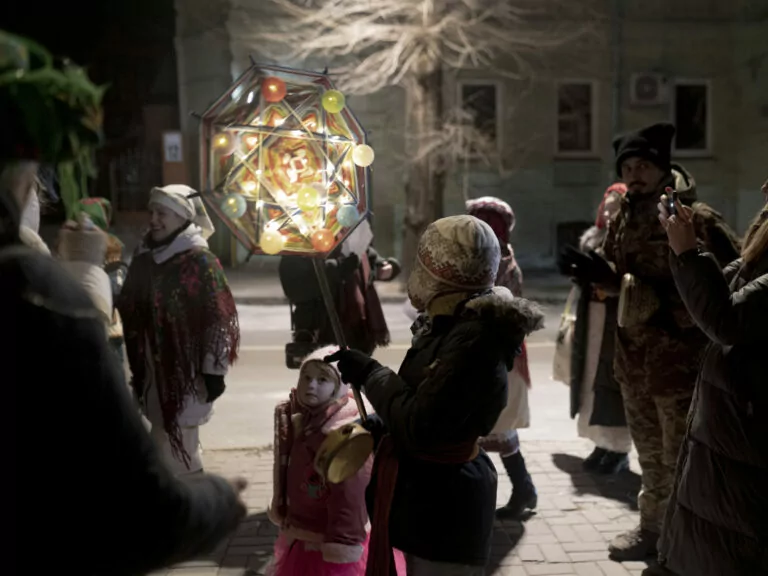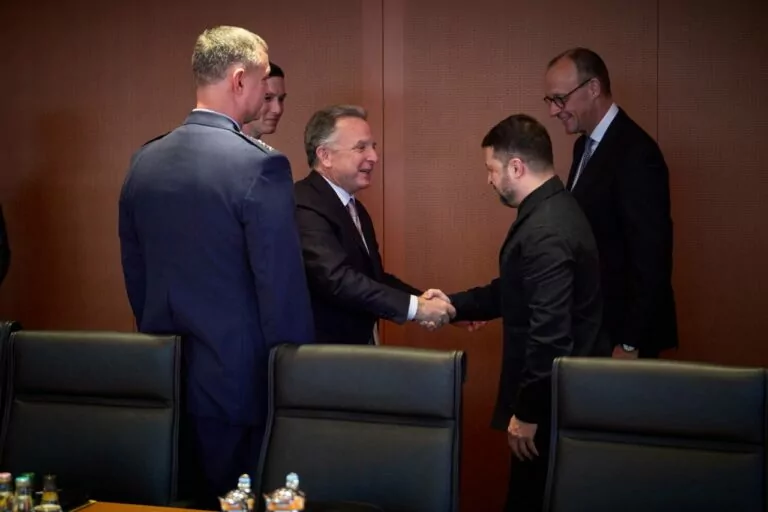Only 28 km separates Piatykhatky, the city district in northern Kharkiv, from Hoptivka, the checkpoint on the Ukrainian-Russian border. On Feb. 24, 2022, the neighborhood based on the National Science Center Kharkiv Institute of Physics and Technology, boasting the Special English School and Karazin University School of Physics, became the frontline.
The invasion began right here, when Piatykhatky residents woke up to the sound of explosions before 5 a.m., and the first Russian tanks crossed the state border. Two armored personnel carriers were neutralized near the university Physics Faculty building on the neighborhood outskirts.
For several days, the district was isolated. The road connecting Piatykhatky to Kharkiv city center, Belgorod Road (now Kharkiv Road), became dangerous because of fighting. The neighborhood was constantly shelled for seven months before the Kharkiv Oblast liberation. Residents say there is not a single building in Piatykhatky not affected by artillery and rocket attacks. Locals hid in the school basement; some stayed there for months.
The first grocery shops and transportation returned to Piatykhatky only in autumn.
I am Tetiana, the editor of the English version of Gwara Media. Piatykhatky is my native district, the place where I grew up, went to school, and where my parents and granny lived at the beginning of the full-scale Russian invasion of Ukraine. After one year and four months of full-on war, I went there to show you my native neighborhood.
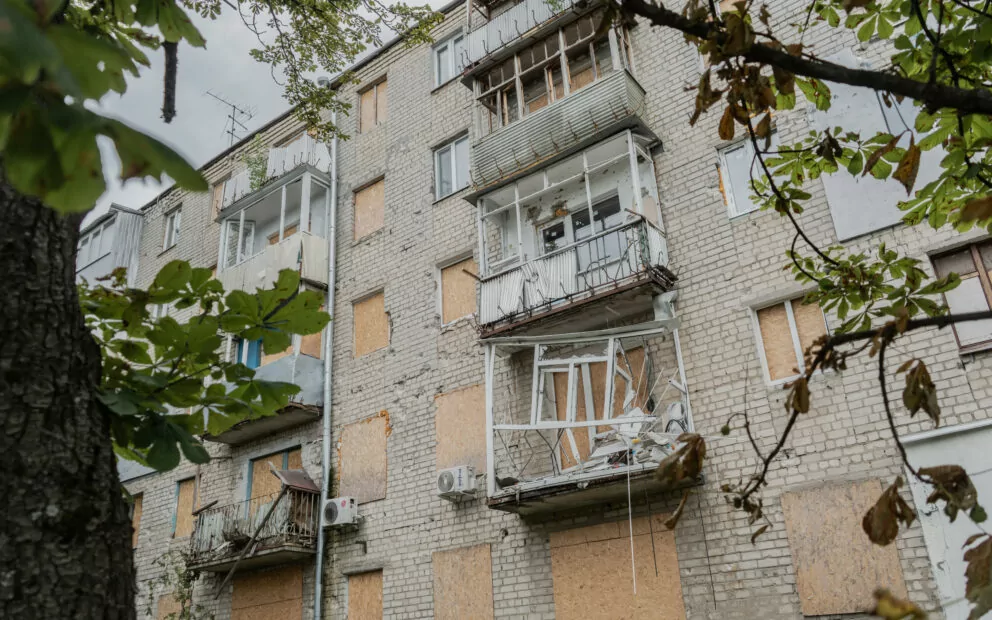
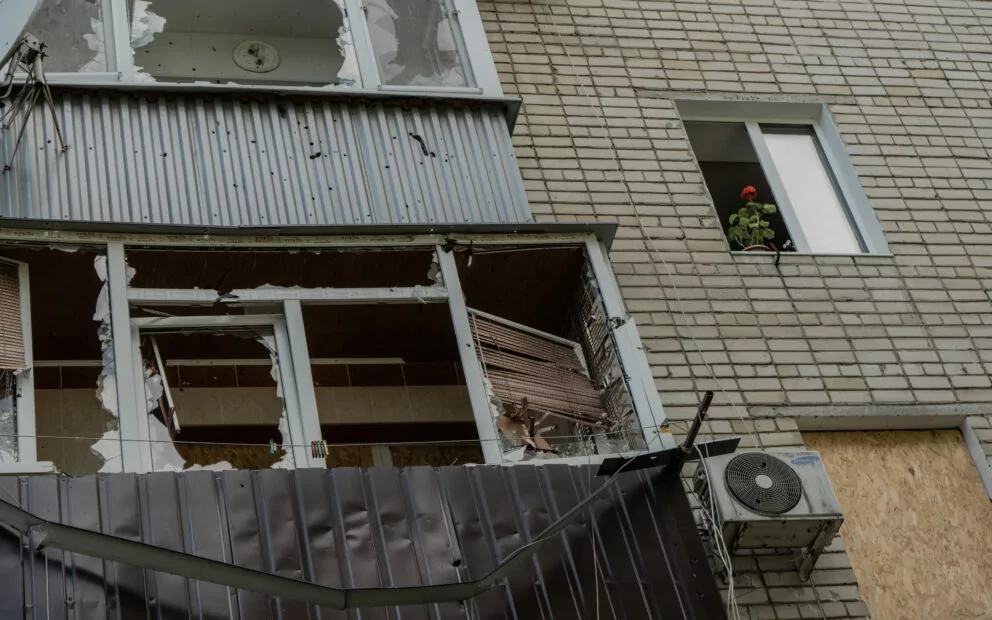
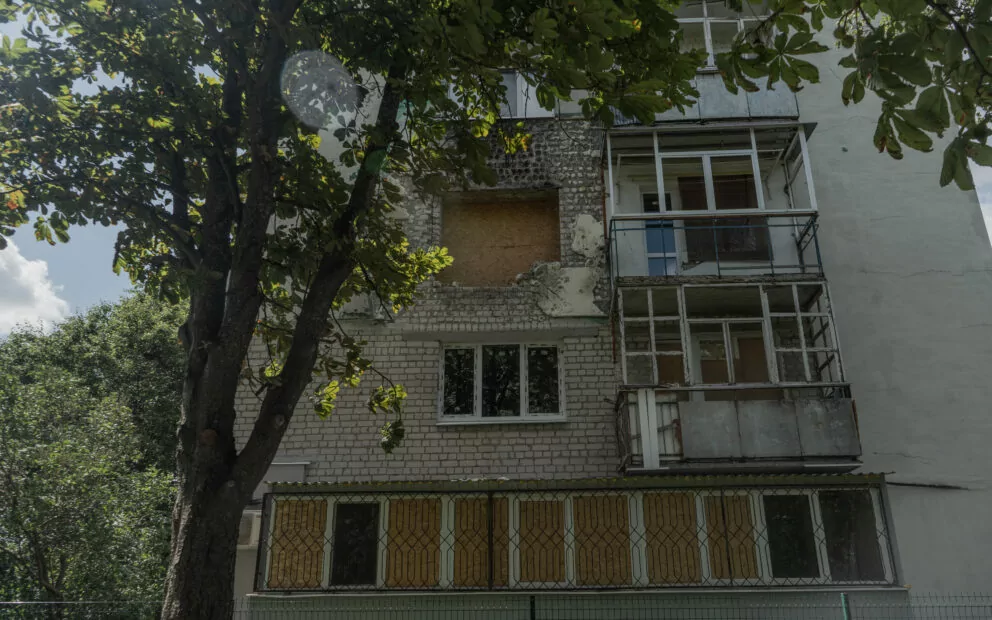
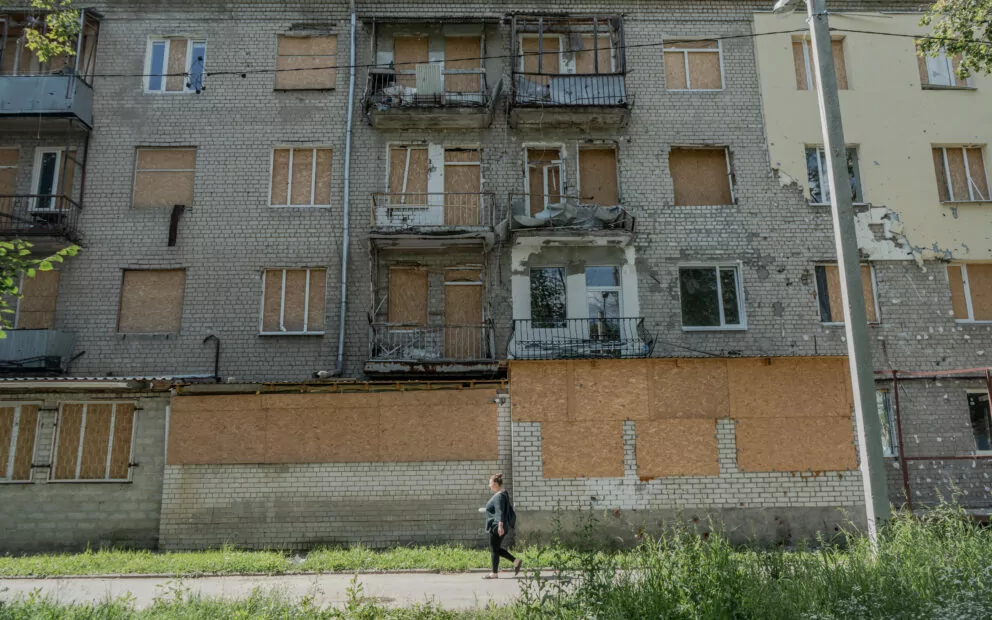
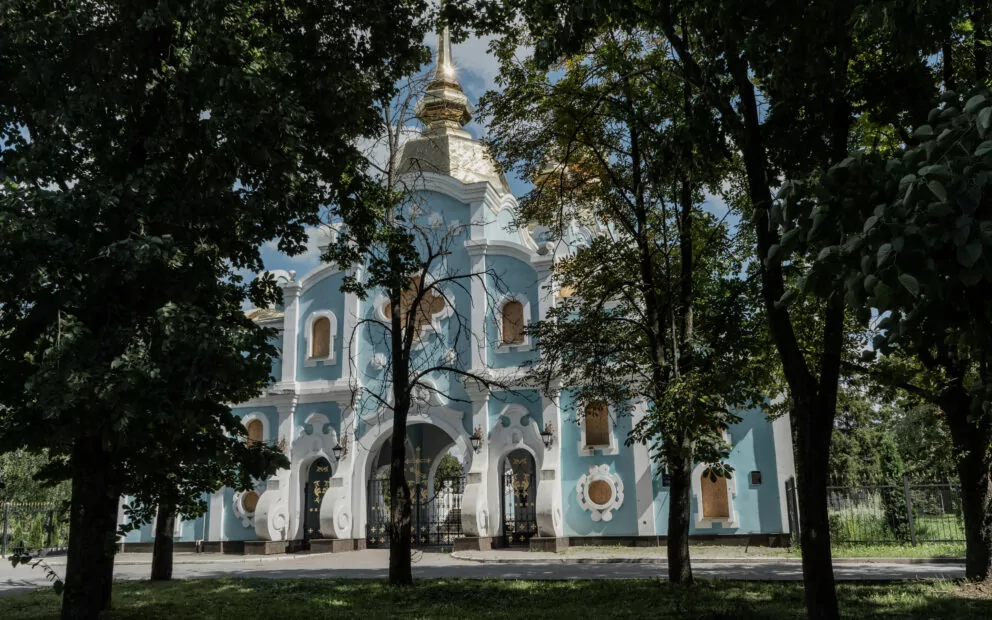
The school
A man stands in the middle of a crushed hall. The bright sky can be seen through a giant hole in the roof. Children’s clothes and sports shoes still hang in the changing room. We are in my native school, meeting with Oleksandr Hrianyk, the principal.
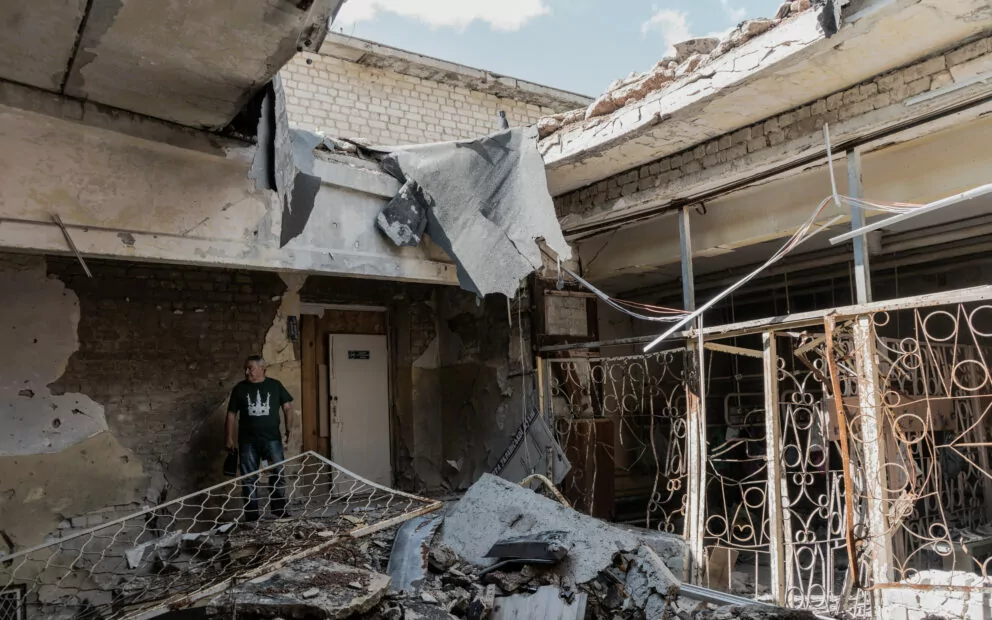
Piatykhatky School #62 (previously called the Special English School due to the deep learning of the English language, and now a lyceum) consists of three buildings. We are in the largest, where the kids from the fifth to eleventh grades studied. The primary school building remained intact. In the first month of the full-scale invasion, its basement sheltered Piatykhatky residents.
“”Since 24 of February in the primary school, the only building with a basement – it is not a shelter, but a former changing room, but still it is underground – since the first days of the war, there stayed more than 150 residents. The place is not designed for that many people, but in those conditions, people were glad… For the first two nights, they slept sitting, all with babies and elderly people…” recalls the school principal.
Oleksandr Hrianyk was one of the few people who remained in Piatykhatky to help the locals. He organized a shelter in the primary school building, which later became an Invincibility Point [spaces throughout Ukraine equipped with power generators to provide the residents with heating and electricity during blackouts], and a volunteers` headquarters. The school had sufficient food supplies for the canteen, distributed to residents.
“The hardest month for us was April. From March 30 till May 2, we had no connection, electricity, or water…it was tough.”
During the stiffest month, the 12,000 population of Piatykhatky was reduced to 300-400 people. According to the school principal, people started to return gradually at the beginning of autumn, and now the population has almost reached half of the previous quantity. The city council has started renovating some of the damaged premises.
“They renovate the city’s building. Unfortunately, those belonging to enterprises – and we have three dormitories in Piatykhatky – have zero chances; the enterprises don’t have resources for rebuilding.”
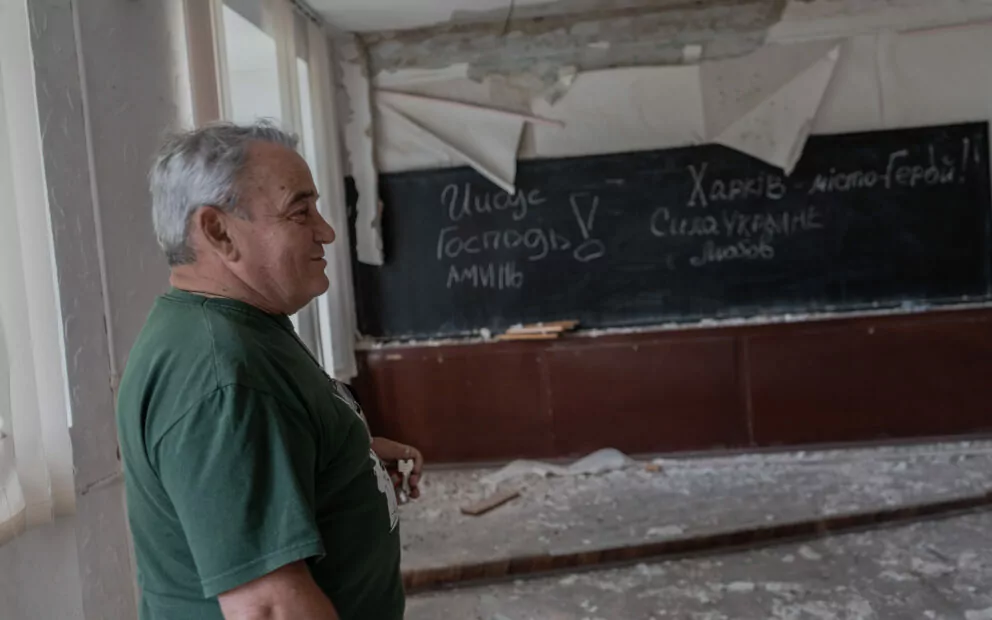
On April 8, 2022, five bombs hit the main school building.
“On April 8, our personal school tragedy happened. The main building of our school was ruined due to the bombardment and artillery shelling. Almost not a single classroom and none of the school premises remained intact. Some of the windows were, as we say, “injured” before that day, but the tragedy for all of us – the teachers, the students, the parents, all people for whom the school has been our whole life – it is a tragedy, it happened on April 8.
The first emotion I had entering the utterly ruined building on the morning of April 8 was the feeling of a fantasmagoria. It was impossible to believe it. When you have lived here for 45 years, and it is your whole life, not just the place where you work… But to be honest – I am not trying to pretend or something – I actually somehow had a feeling that all this would pass. Time will come, and we will rebuild everything and make our school even better than before that day.”
Oleksandr gets silent for a moment before he speaks about the things that can never be recovered. One of the school’s students, ninth-grade learner Denys, was killed while helping his parents to evacuate the bison from the eco-park. “The projectile hit the child when he was helping the animals to get to the transport. That attack targeted the most important thing that any person can have – the hope for tomorrow.”
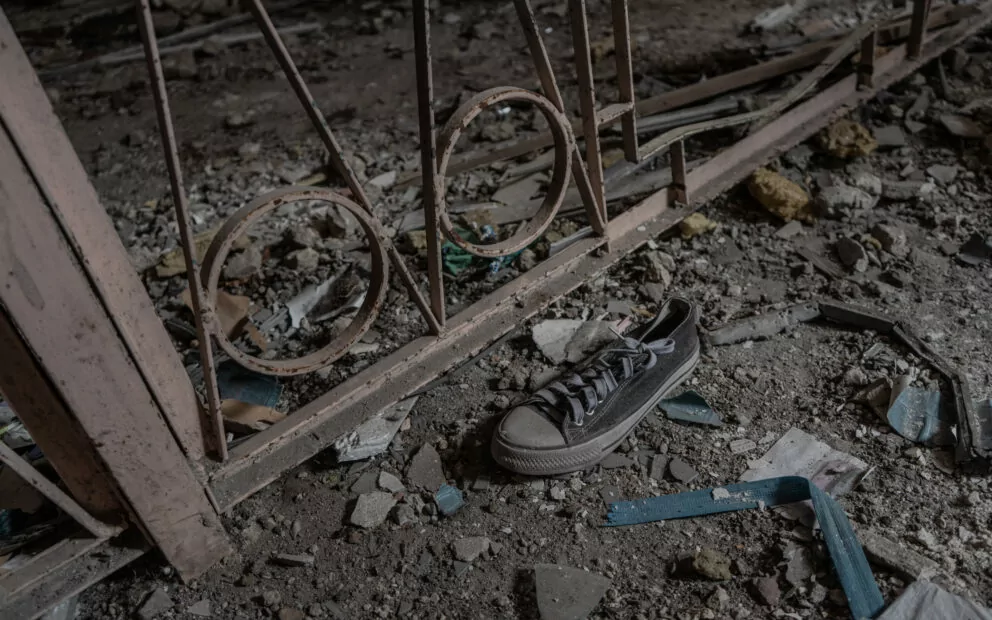
“It is a so-called Czech project,” the man takes us on tour, lovingly showing the damaged school premises. “Here we have a joint canteen and assembly hall.
I am not an expert in these matters, but there were bombs on parachutes [can be multiple rocket launchers or cassette projectiles]. Later we had to put away those parachutes. One of those bombs hit the hall roof. Here we passed by a pile of rubble; that rubble covers the hole caused by the strike.”
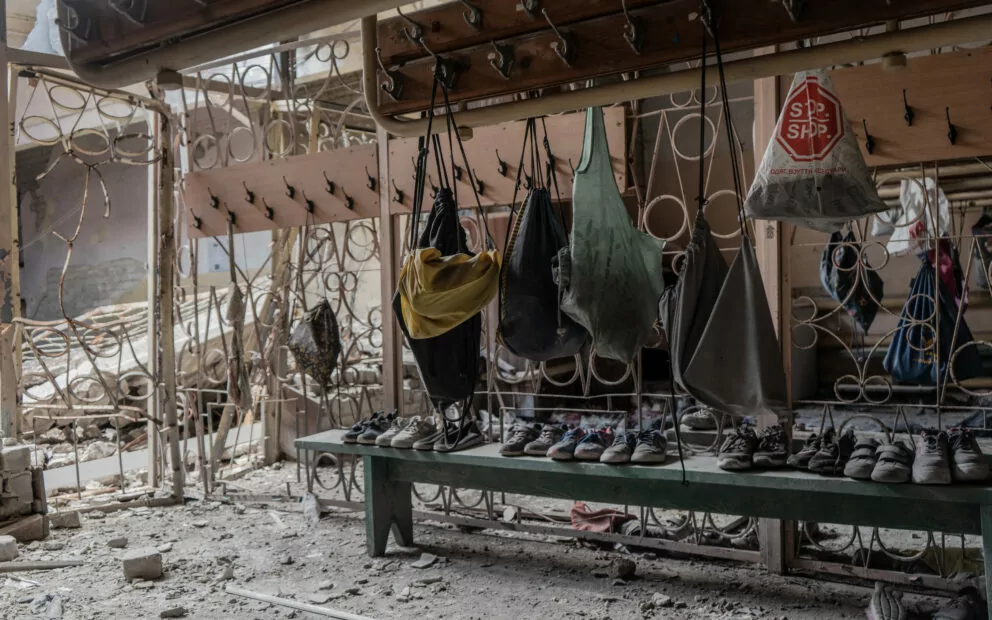
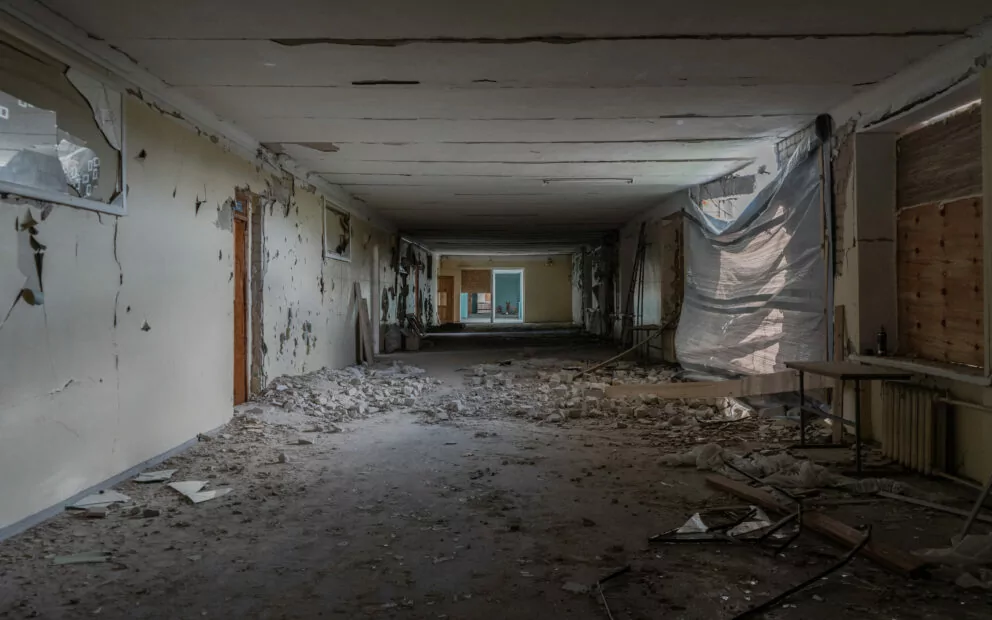
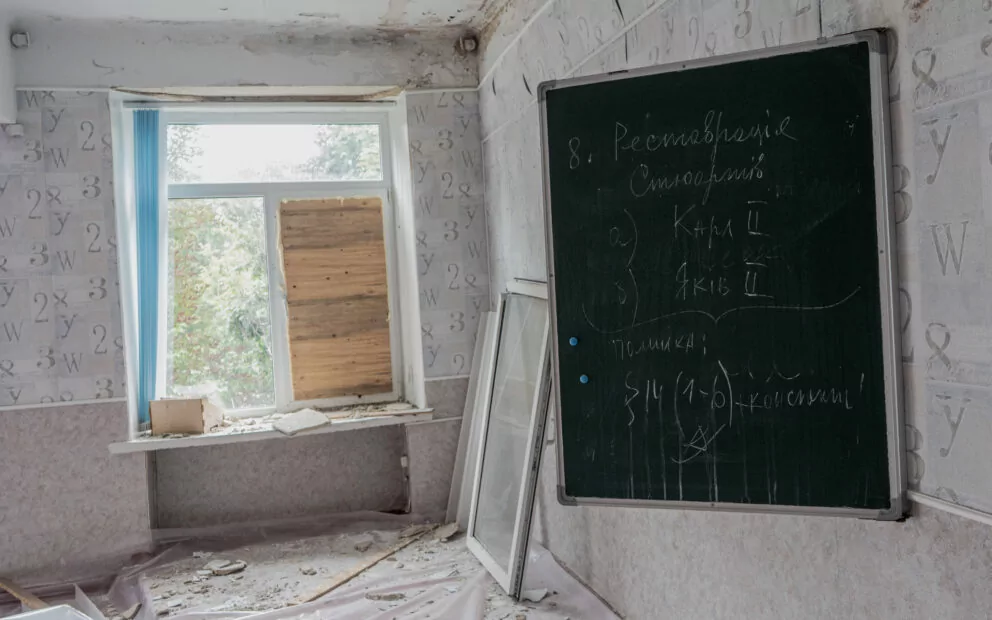
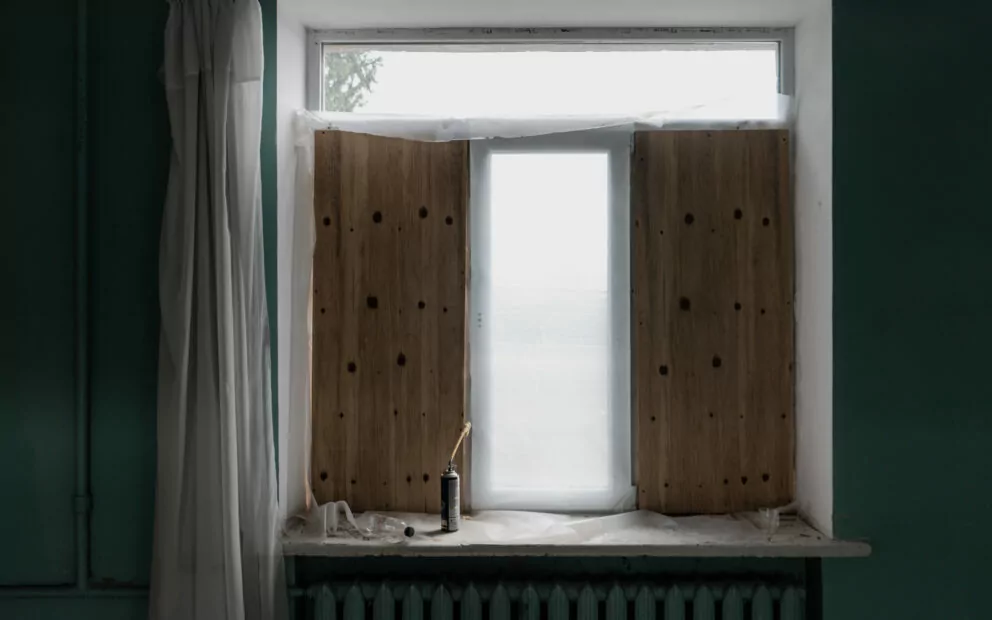
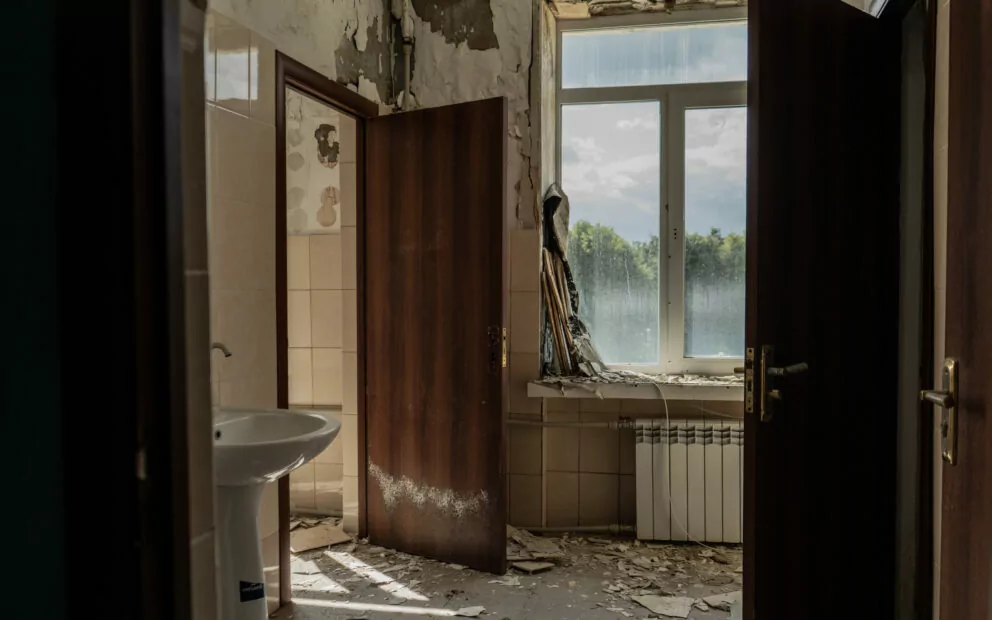
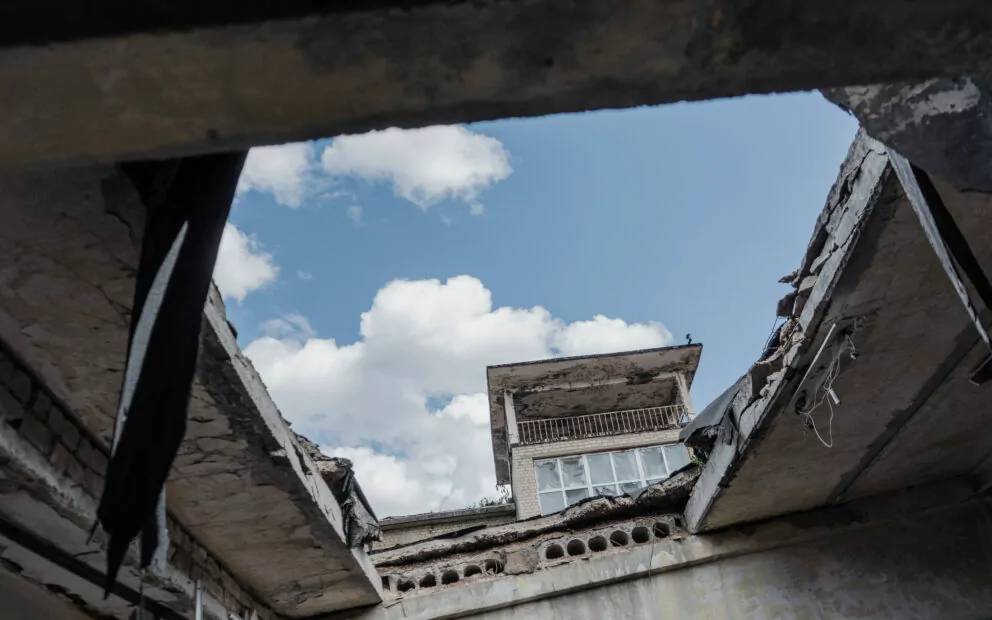
Ironically, the most affected classroom, literally smashed with the projectile hit, is where the Russian language and literature lessons were held.
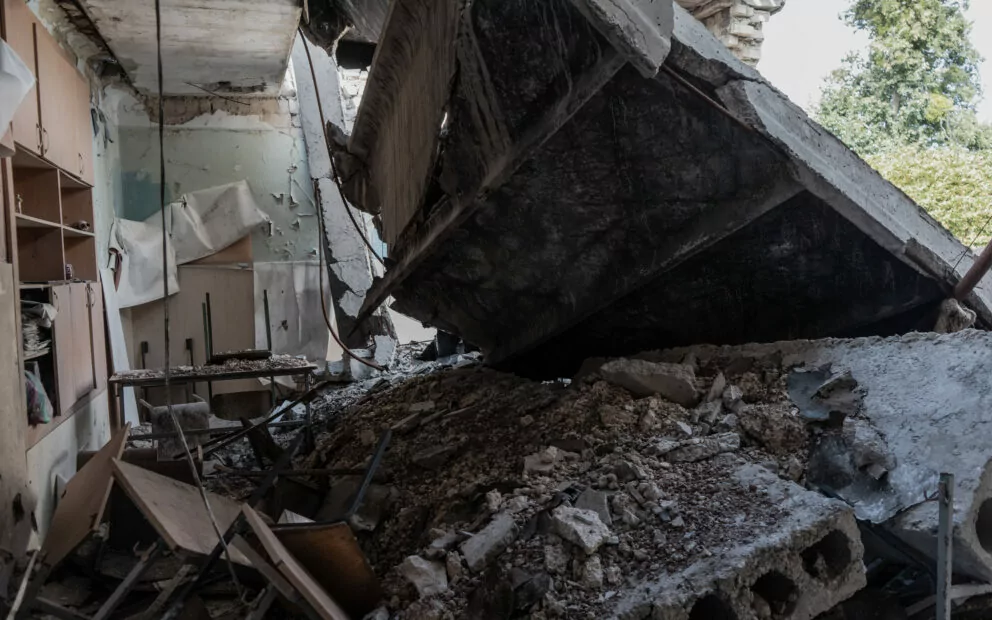
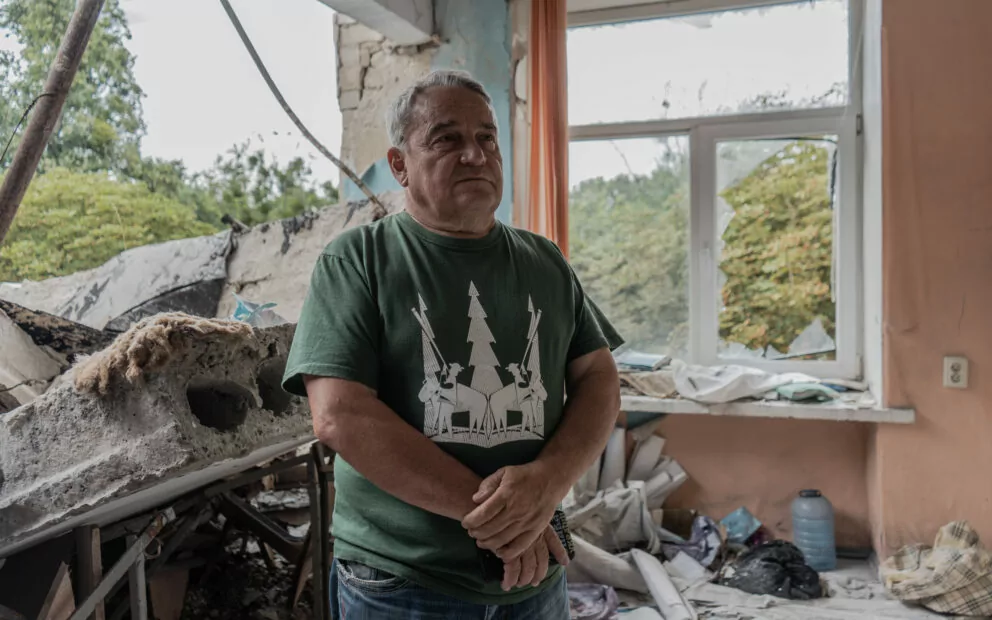
Symbolically, the only room in the whole school that remained intact is the so-called Chamber, a classroom turned into a school Ukrainian ethnography museum. It contains a collection of handicrafts from different parts of the country, the children’s art pieces, old rushnyks, and vyshyvankas [traditional embroidered towels and clothes], all handed over by student’s families.
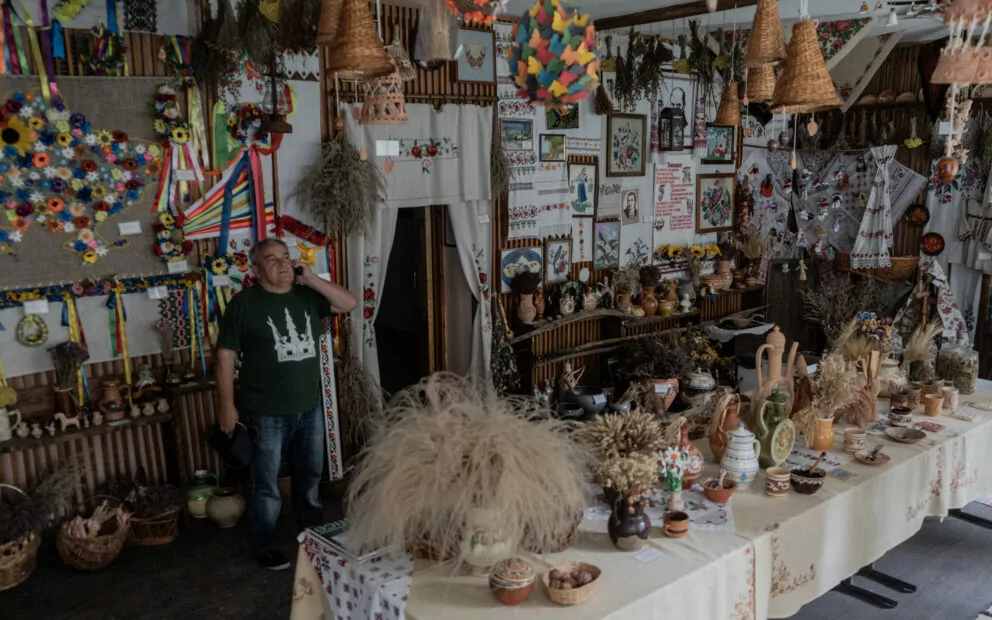
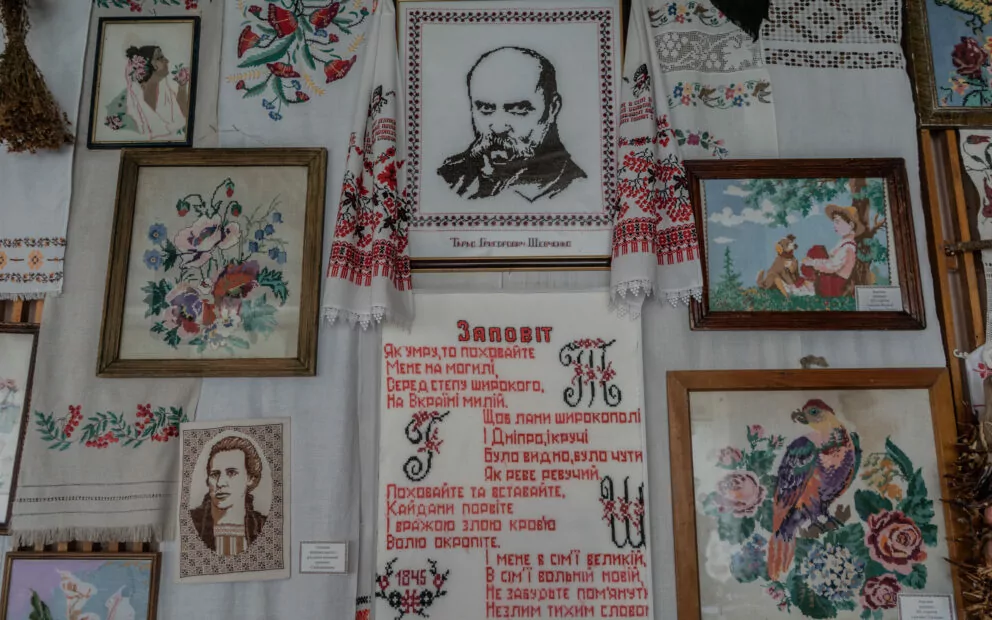
“This room remained intact despite being on the “frontline” of the shelling trajectory. I consider it a reproach for our enemy and proof that we are invincible, and our spirit, history, and truth are unconquerable.”
When a city delegation with the Kharkiv Mayor visited the school in February, they scheduled its reopening for Sept. 1, 2024. The Japanese delegation that has visited the school twice has promised help. However, even the approximate amount needed for renovation has not been named so far.
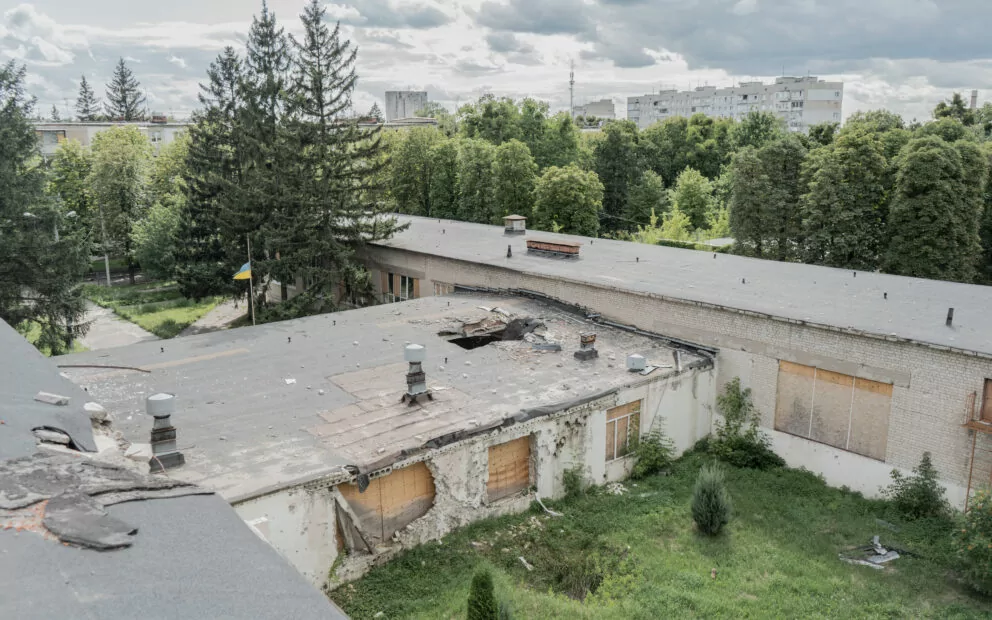
Before the full-scale war, 1141 children studied in the school. Nine hundred sixty-one kids learn here now – obviously, online, some combining the school abroad and online learning in Ukraine. “The tendency is more pupils leave than come,” says the principal. “At the same time, we see some students who join online classes on the way from their European offline school, and they literally join the lesson from the bus – not to miss Ukrainian classes.”
“The war has revealed such a deep love of children to their school. Some come here, hug their desks, rest a cheek on its surface, and say, “Oh, my beloved desk, I miss you so much.”
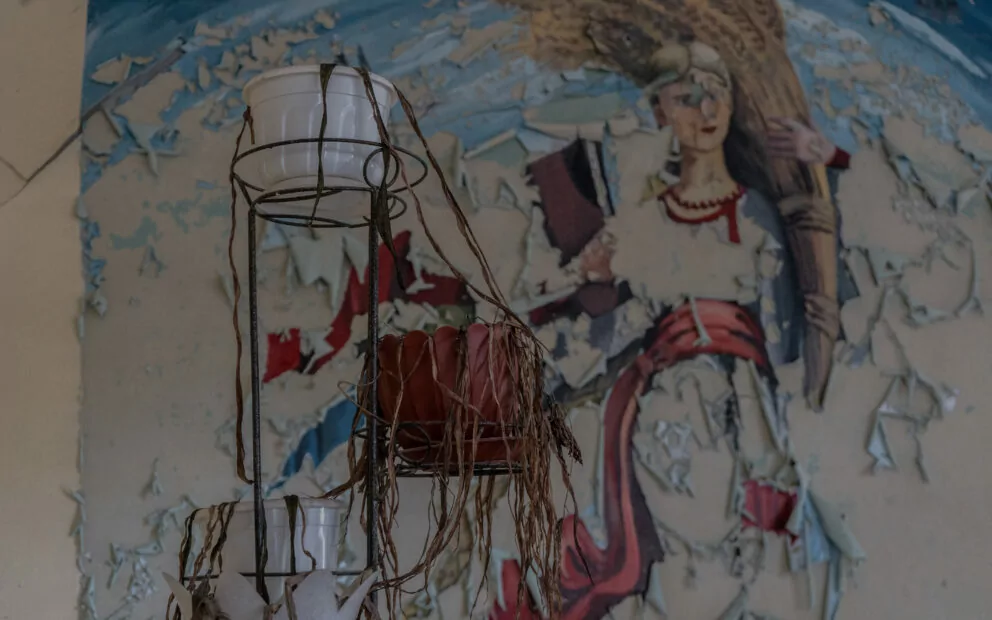
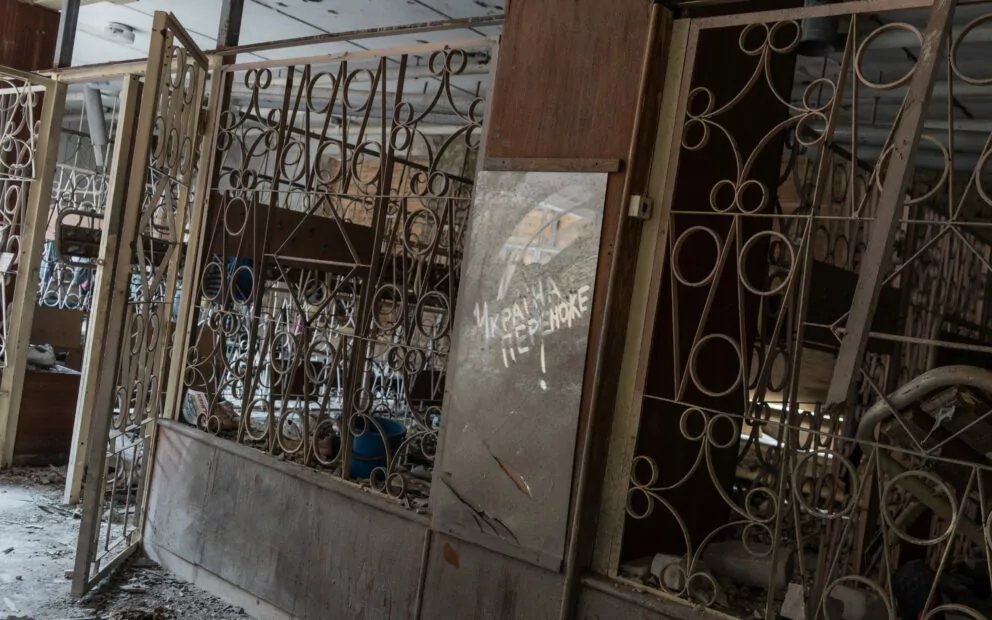
The dormitory
“Are you here to help us?” A woman with a bag of raspberries is heading to the entrance of the half-ruined residential building. She stops having noticed our camera and attention to her house.
The ruined house is the Kharkiv Institute of Physics and Technology dormitory. Tetiana, 59, the institute employee, lived here with her family. Now they are forced to stay at friends` place.
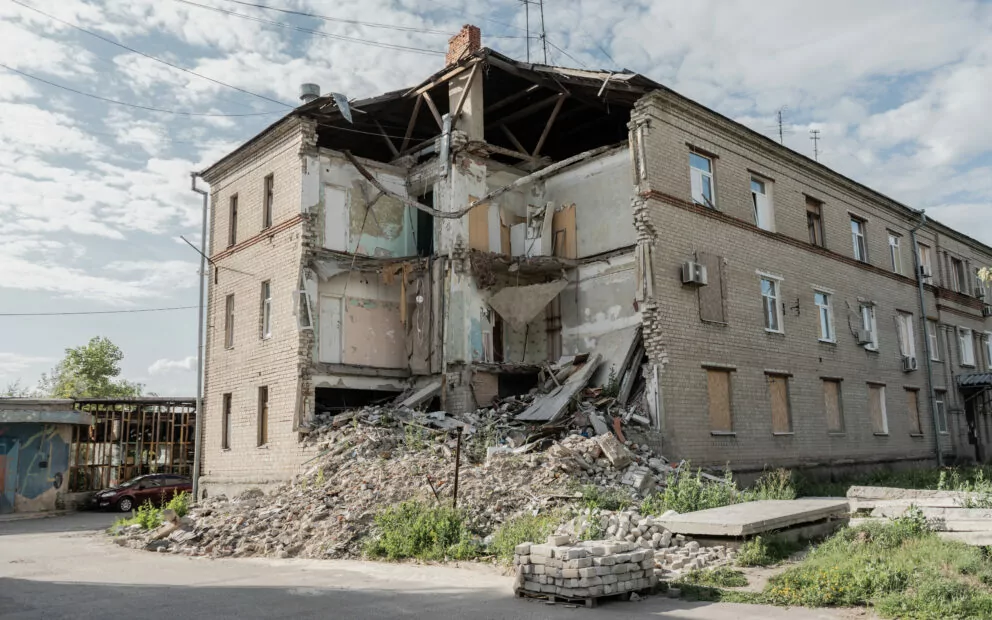
The Russian attack damaged the building in the spring of 2022. One dormitory resident was killed. Those who had to flee the collapsing house left everything behind – according to Tetiana, even people’s documents could be found on the ruins. Piatykhatky residents talk about a man in the bathroom brushing his teeth at the moment of the strike. He realized he could not make another step forward when he opened the door. The floor was not there anymore.
“We stayed here, on the first floor, when that [the strike on the building] happened, me and my husband. We lived in a dormitory, but we actually liked it. It was okay, and we had everything we needed. We had a room, a shared bathroom, and a kitchen; everything was nice. And now we don’t know what to do and have nowhere to go. Sorry, I can’t talk about it without tears,” we see the woman holding back crying.
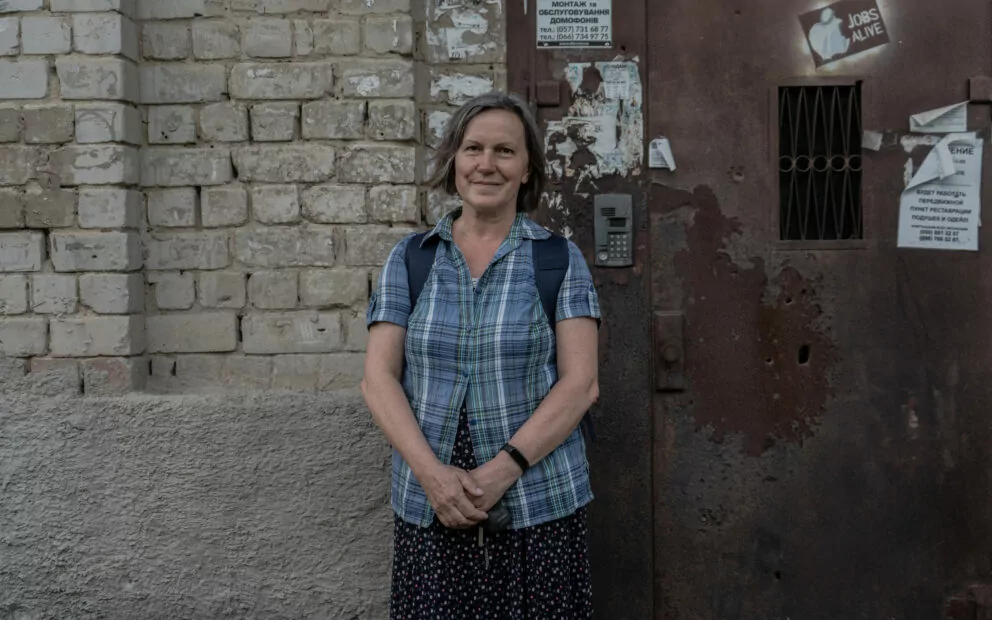
Tetiana comes home to put things in order – as much as possible in the half-ruined building without electricity or water supply.
“We are ready to rebuild everything with our bare hands. The problem is, first, we need to dismantle the rubble, which is physically impossible for a human. We need equipment.”
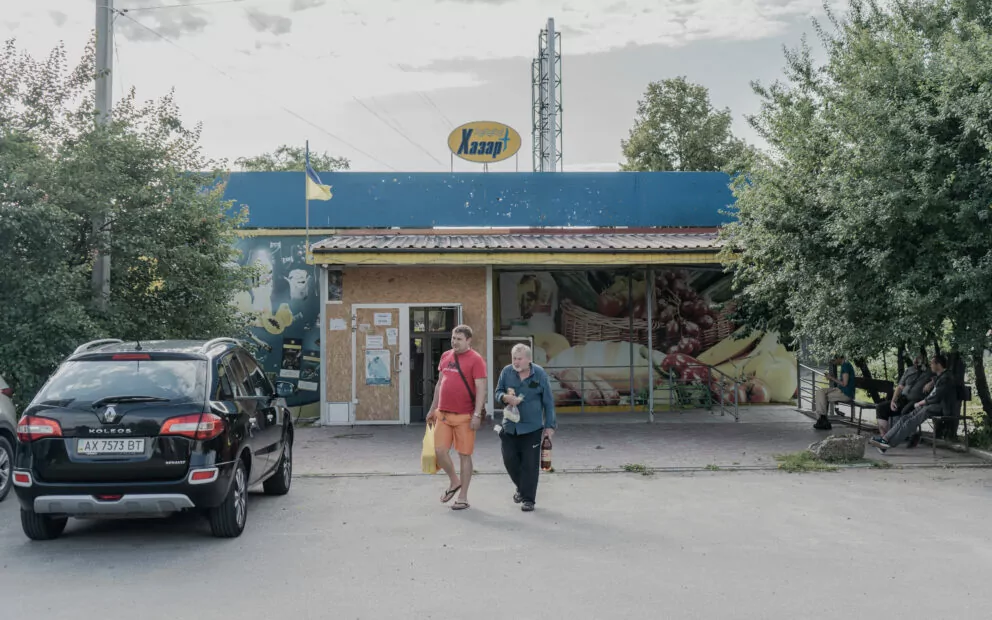
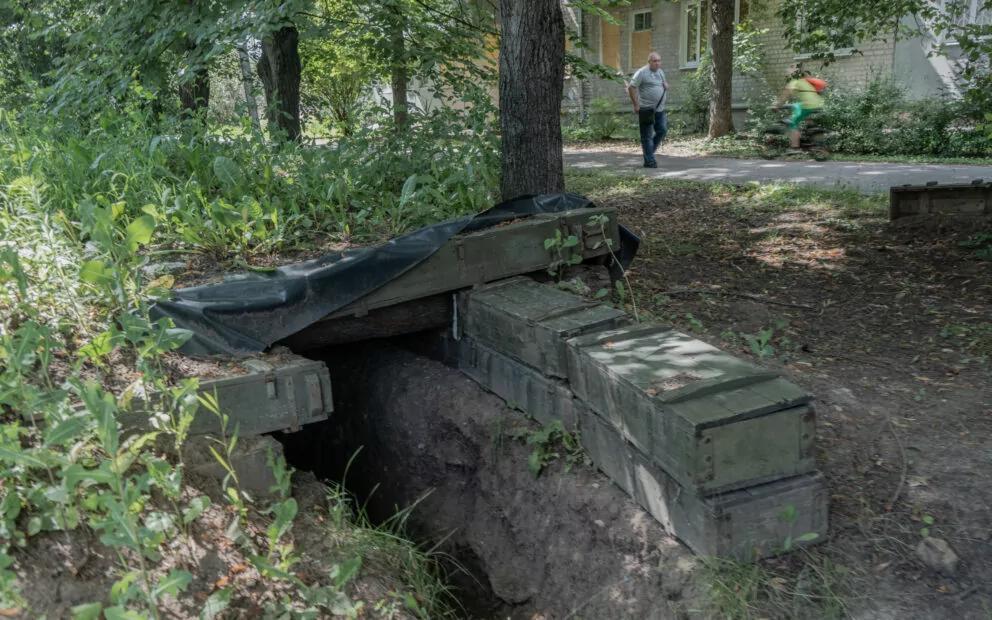
The dormitory building is considered to be the institute’s responsibility. That is why the city council does not give any promises to help the residents. “Mayor Terekhov has come to us; we have addressed Governor Syniehubov and the institute’s administration. No one gives us any hope. And the institute does not have the resources to help us; they have their own problems, as their building was damaged too. I work there, I know,” says the woman. The hope I saw in Tetiana’s eyes when she started talking about her home fades away.
“But I hope for the best,” suddenly says the woman. “It just has to be. God bless you. Can I please give you a hug?”
The cafe
We enter a stylish minimalist-designed room of a coffee shop. Mild background lounge music, filter, and cold brew on the menu and a comfy chillout zone – this place has changed a lot since I was here last.
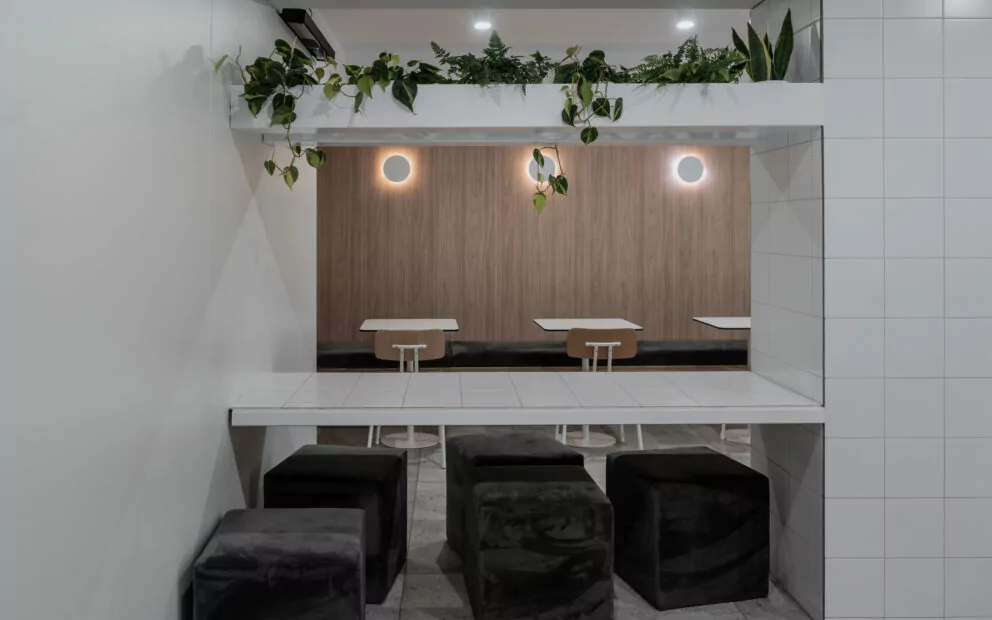
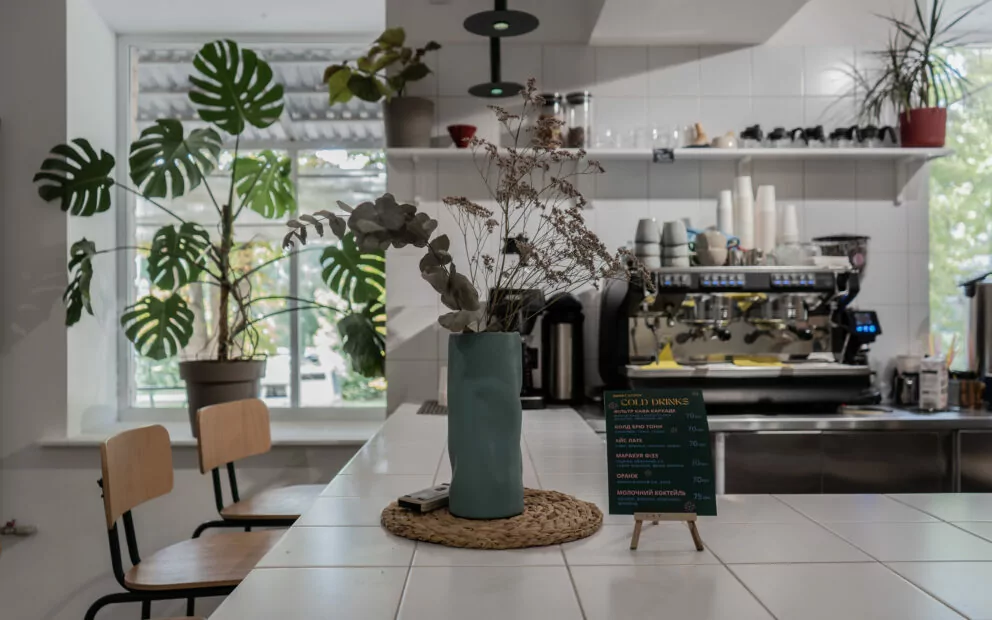
The barista asks not to take photos of him and not to mention his name but is glad to show us around. Moreover, he welcomes us to the new place in Piatykhatky – next door, the coffee shop’s founders opened a space for kids` celebrations and leisure time.
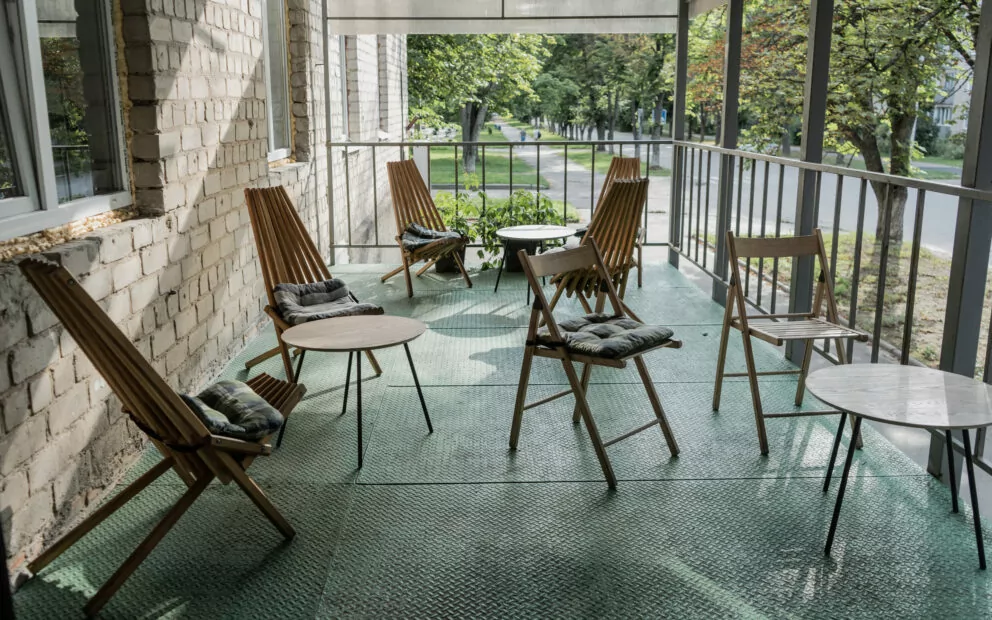
“Do they have clients?” I wonder. Do families with kids return home to the place right next to the Russian border?
“Yes, they do,” comes the answer. “Actually, it is quite nice. They bring balloons here, and the room looks great. Perfect for children’s Birthdays.”
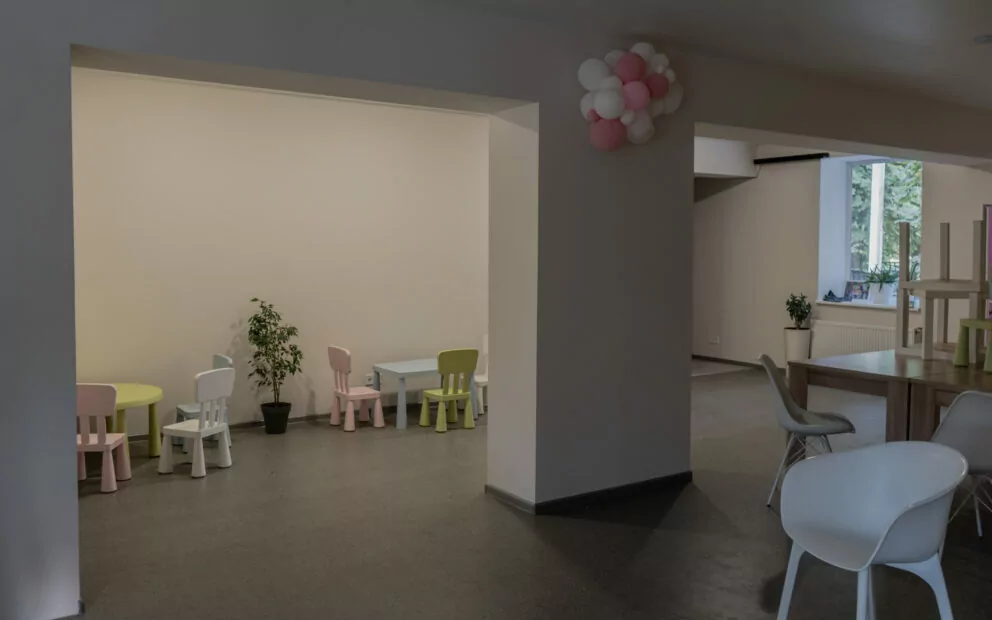
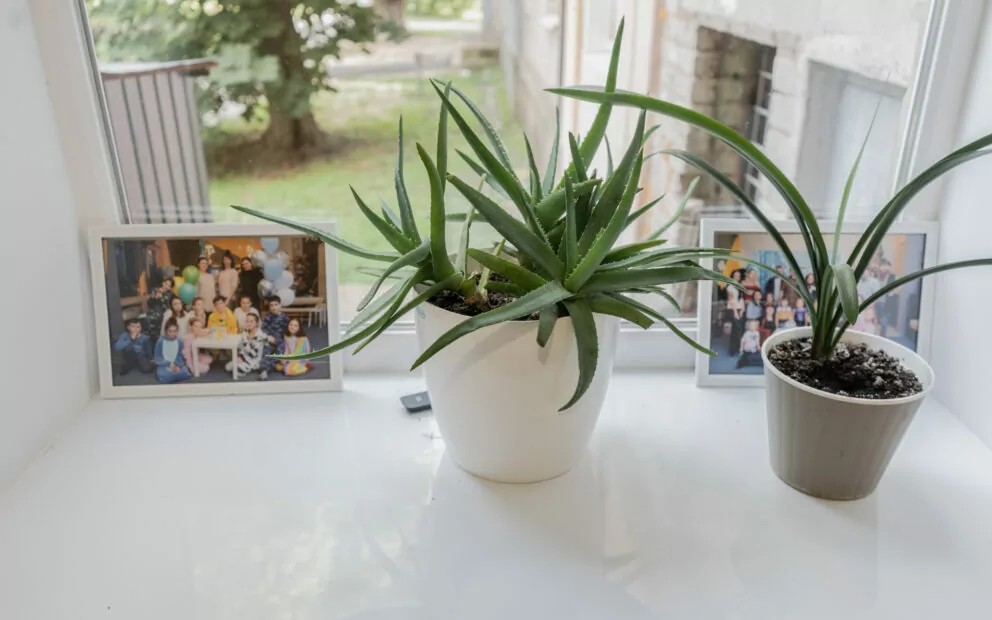
“Once, I bought the balloons for my wife’s Birthday here. A whole bunch of balloons. I looked like an idiot with these balloons walking the street, but I don’t care,” says the barista with a smile.
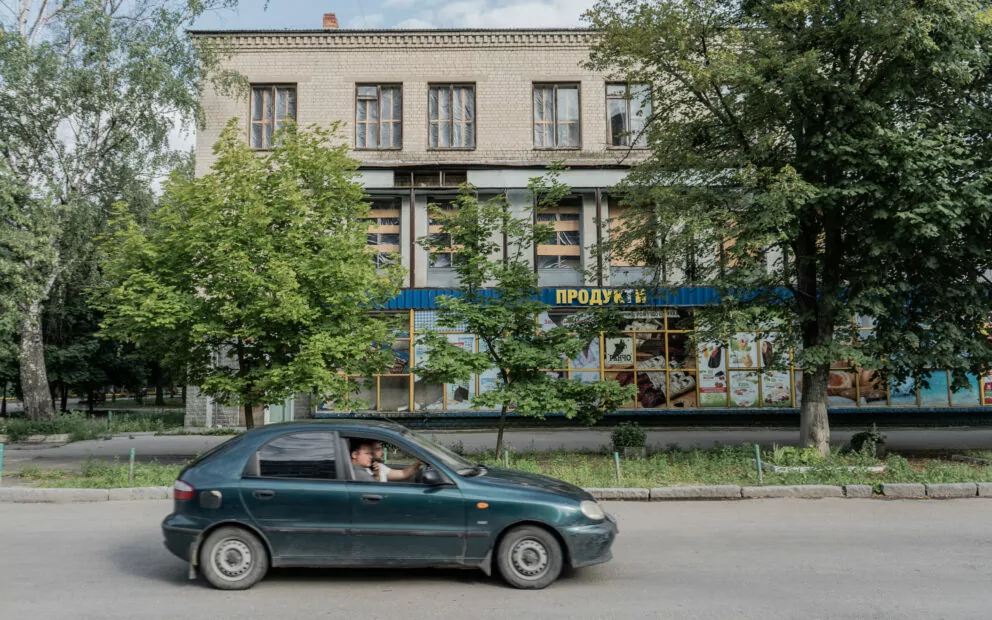
We thank the barista and leave the coffee place. It is time for us to go – the taxi drivers refuse to come to Piatykhatky in the evening.
The ruined institute dormitory stands resignedly along the sidewalk, which is being studiously reconstructed. Utility workers carefully plant the flowers at the local boulevard. Tired residents hurry home after work. The Ukrainian flag hovers stubbornly over the damaged school.
Same as Tetiana, I want to hope for the best. Eventually, there is always hope as long as someone keeps taking care of Ukrainian artifacts, coming to clean the damaged house, and buying a bunch of balloons for birthdays.
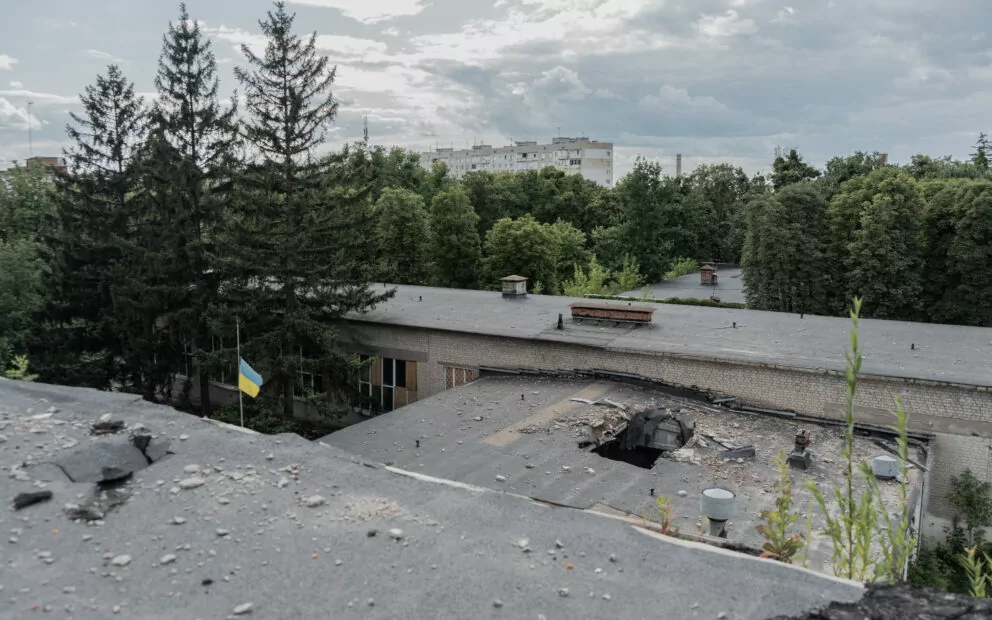
Follow us on Twitter, Instagram and LinkedIn for more news, stories, and field reports by Kharkiv journalists.
